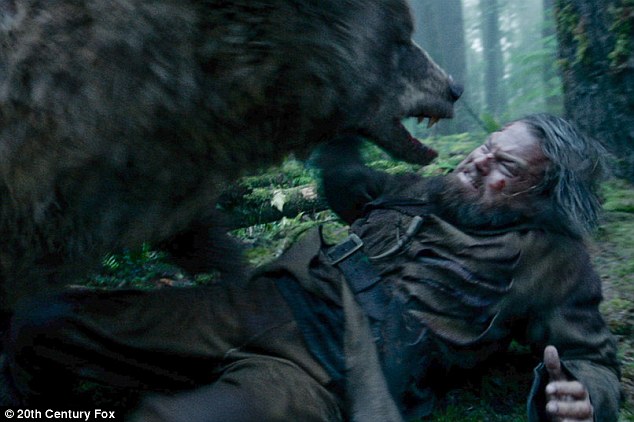The ahistorical addition of extra motivation for Glass makes a story about will and determination into one of revenge and righteousness, a simpler version that retains a primal appeal. It’s the only easy avenue that Innaritu and his crew will take. Filmed in the raw wilderness that the events of the early 19th century also took place in, the cast sure do look wet and cold and miserable. Innaritu and DP extraordinaire Emmanuelle Lubezki give themselves stratospheric degrees of difficulty, staging complicated single shot battle sequences that shift perspectives midstream while paradoxically communicating sheer chaos in a highly regimented endeavor. DiCaprio himself is put through the wringer, eating organ meats and diving into freezing rivers and crawling inside animal carcasses. As a you-are-there experience, Innaritu is striving for sensory empathy in that every grunt and spittle-fleck comes from a place of knowable honesty and physical exertion.
However, the famously showy director cannot help himself from going too far. This is a film that strives for immersion. Why else subject everyone involved to such rigors? Innaritu then breaks that immersion by pushing in too close to DiCaprio and having his breath smudge up the lens. There’s no greater way to break a film than to force the viewer to wait for condensate to disappear so they can again see the whole frame. The actual obstruction is matched by the knowledge that the camera isn’t zooming, but it’s actually being pushed into DiCaprio’s face, another film-breaking mental image that Innaritu repeatedly forces into the viewer’s brain. All the shivering and discomfort of the crew, and costuming in a period-accurate fashion, and finding speakers of rare native languages is cast aside in these moments, where realism is sacrificed on the altar of showmanship. There are Steadicam or stationary single takes, and there are the ones that Innaritu utilizes where it’s obvious that there’s a guy with a camera following the action, bumping into things and weaving through traffic and giving everything the feel of a video game instead of a finely tuned film. Combined with the blatant Malick ripoff interstitials where Glass remembers better times while looking up from the bottom of the frame at forest tree-tops, much of the directing of The Revenant is irritating once the initial wow factor wears off.
As the people that have to endure The Revenant in front of the camera, the actors are largely able to craft compelling performances through their chattering teeth. Poulter’s wide-eyed naif gets across how over his head he is, while Gleeson has never been better as a credible leader of rough men. Hardy’s doing another of his accents as Fitzgerald, notable because Innaritu and Smith give him the most lines. Hardy’s Fitzgerald is exactly as brutal as the environment, often right about what the circumstances require but the only one callous enough to put the option forward. His habit of remembering the times he does something heroic or benevolent for someone, while conveniently forgetting the times when something was done for him, makes him a recognizable narcissist, though he’s pushed too far into outright villainy with his murderousness and his aggressive racism. DiCaprio spends most of the film alone, communicating the same sense of mourning and grim determination. He makes it apparent that he went through some shit while filming the Revenant, but it’s a role that any intense actor could’ve done. DiCaprio doesn’t make his Glass into a specific person as much as a freak athlete who somehow managed to do something physically incredible. I was no more interested in Glass as a person when he was riding a horse off a cliff than when he was cauterizing his wounds with gunpowder. It was all suffering, ably communicated through gritted teeth and yelps.
Innaritu’s Birdman was extremely dense with dialogue and had big ideas on its mind about art and fulfillment, or at least it wanted to believe it did. The Revenant is far more streamlined, and not the better for it. In the same year, George Miller also put Tom Hardy through a physically demanding shoot for Mad Max: Fury Road, and he remembered to make his film about more than misery and an impulse so elemental that humans share it with flatworms. The Revenant is an expensive and ornate package for self-preservation, and one that doesn’t appear to warrant all the trouble that went into it. Eat the steaming liver, but Bear Grylls does that on cable television, with impressive nature photography not unlike The Revenant’s to boot. Leave Fear Factor to Joe Rogan. I want something more out of film. C

 RSS Feed
RSS Feed